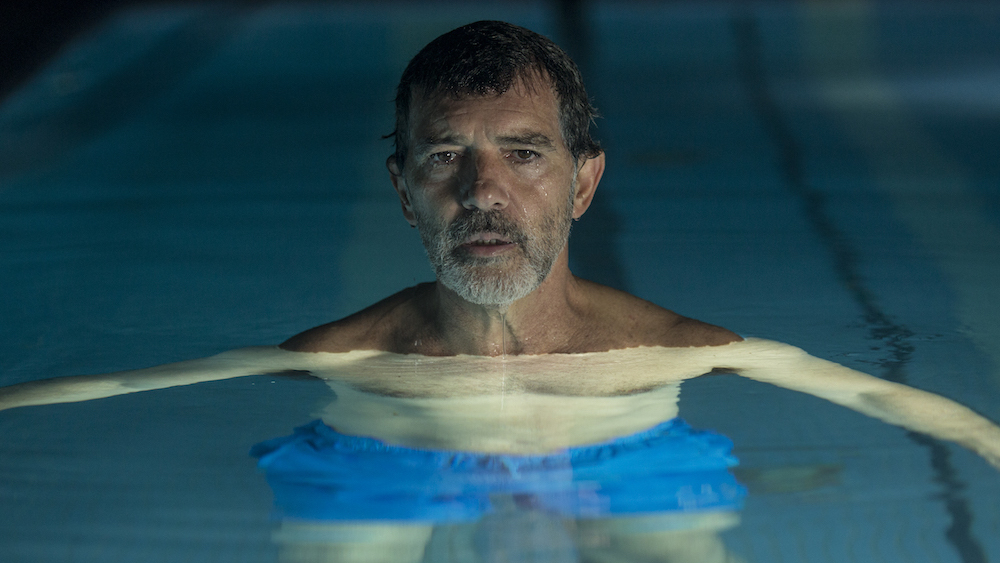PAIN AND GLORY (Dolor y Gloria)
Sony Pictures Classics
Reviewed for Shockya.com & BigAppleReviews.net linked from Rotten Tomatoes by: Harvey Karten
Director: Pedro Almodóvar
Screenwriter: Pedro Almodóvar
Cast: Antonio Banderas, Asier Etxeandia, Leonardo Sbaraglia, Nora Navas, Julieta Serrano, César Vicente, Asier Flores, Penélope Cruz, Cecilia Roth, Susi Sánchez, Raúl Arévalo, Pedro Casablanc, Julián López, Rosalía
Screened at: Sony, NYC, 9/12/19
Opens: October 4, 2019
Dedicated Almodóvar fans may be disappointed with his latest venture, a thinly disguised biopic of his own life or, as the woman performing as his mother complains, afraid that auto-fiction will reveal too much. The director is known for pictures as daring as the titles such as his dark comedy “Woman on the Verge of a Nervous Breakdown” (a woman seeks to discover the reason her lover left her); the romantic comedy “Tie Me Up! Tie Me Down!” (a former mental patient kidnaps a porn star hoping to convince her to marry him); and the psychological thriller “The Skin I Live In” (a plastic surgeon experiments on a skin he develops to withstand damage). Now in his sixties Salvador (Antonio Banderas), standing in for Almodóvar, is wracked by ailments; by migraines, tinnitus, back pain after spinal surgery, and near the conclusion a potential tumor causing him to choke on food and drink. Aside from his physical pain, he feels isolated. His health prevents him from making movies, work which keeps him going and which, when halted, leaves him feeling isolated (as he shows early on immersed in water) and depressed. His life is not as interesting as his movies, but then again how could it be, considering that the director himself is A-list, one of the great living filmmakers of our time.
Nonetheless Almodóvar believes that a selective memoir could involve an audience. We see Salvador’s life divided into three periods: the 1960s as a nine-year-old boy; the 1980s, which is given the least amount of celluloid, where he has had an affair with Federico (Leonardo Sbaraglia); and the current year when the suffering filmmaker depends on the care of his assistant Mercedes (Nora Navas). The narrative is not chronological. The man in the current year lives in a large house, cabinet painted bright red, filled with paintings that made one of his visitors think he was in a museum. Salvador frequently drifts off dreaming of what he may consider the idyllic time of his life, when though poor and living in a cave, he is excited by reading and gets his first sexual fantasy that is so strong that it knocks him off his feet.
This early segment is the most interesting unless you have been going to a series of doctors yourself trying to get a diagnosis that nobody can give you, and you relate strongly to the pain that Salva feels. The nine-year-old future filmmaker (Asier Flores) living with his patient mother Jacinta (Penélope Cruz) in a cave—not considered bad digs by the people of the village—is obviously a prodigy, playing piano, lead singer in the church choir where comic touches feature a few boys with atrocious voices, and teaching an illiterate painter Eduardo (César Vicente) to read. When Eduardo washes himself, barely covered by a towel, Salva faints with the intensity of the feeling and, yes folks, your nine-year-old has sexual feelings as well. His mother senses the attraction and hides a sensual painting that Eduardo does of her son.
Two men capture Salvador’s attention in the present years. Federico, with whom Salva had a love affair in the eighties, visits the ailing filmmaker after decades of separation. In an emotional scene they reminisce about those good years and part with a long kiss. And Alberto (Asier Etxeandia), an actor who visits, having appeared in a Salvador’s eighties picture and has not spoken with his director after being insulted by him thirty-two years back. He introduces Salvador to heroin—which for the movie audience supplies the beauty of Salva’s dreams of his childhood. Having not acted in years and feeling as useless as Salvador, Alberto finds purpose in delivering a monologue on the stage, witnessed by Salvador’s former lover Federico.
Though this is arty theater, there is nothing difficult to follow in case you happen upon the film and as a lover of commercial movies may never have heard of Almodóvar. It approaching the stereotypical French style by being talky, and it’s good talk, much delivered with hallucinatory images in Salvador’s mind. As in all of the director’s films, we are treated to his basic themes of desire, passion, family and identity all against bright, colorful backgrounds. If you’re over 60, you have likely been exposed to the vicissitudes of life: the pain that tags along with the glory. If a teen, you recall the desires of a young person often unfulfilled because of innocence. And parts of the film may reflect the melodrama that accompanies you during the most exciting, yet anxiety-producing moments.
113 minutes. © 2019 by Harvey Karten, Member, New York Film Critics Online
Story – B
Acting – B+
Technical – B+
Overall – B+

